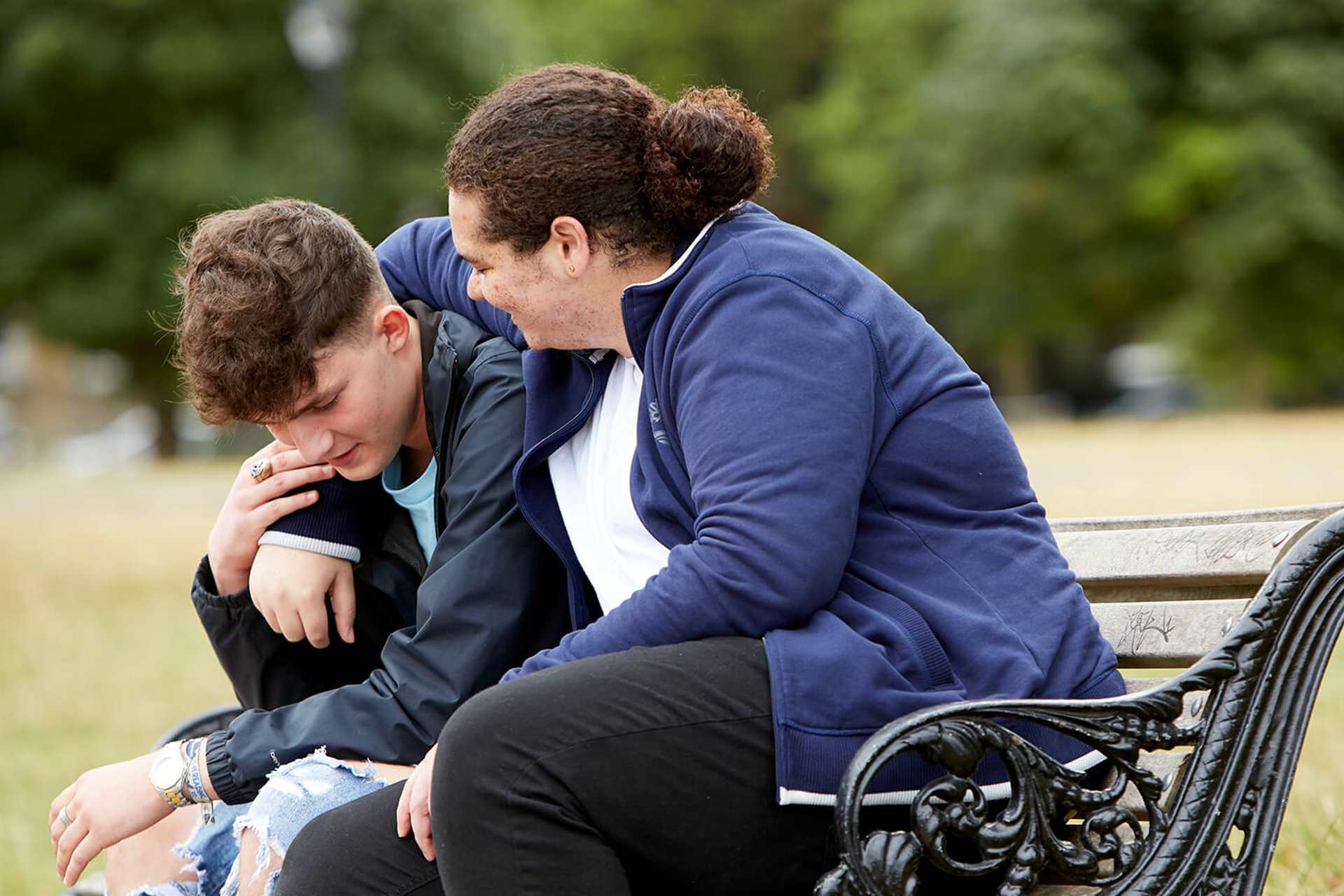Topics mentioned: panic attacks, anxiety, school, medication
About: Charlie, 20, experienced panic attacks when he was at school and shares the coping techniques that helped him when he was struggling.
Most mornings, it was a struggle to get the bus, and if I did go to college, I would rarely be able to attend all my lessons.
They always begin the same way for me - with my heart beating at the pace of a drumroll. Shaking legs, sweaty palms and rapid breathing follow soon after.
Lights and sounds intensify so much that everyday settings such as supermarkets can feel like dizzying nightclubs. My thoughts race, but they focus on just one thing: how do I make this stop?
Since I was ten, I have dealt with infrequent yet intense panic attacks; when I started college, however, I began experiencing them up to three times a day. Most mornings, it was a struggle to get the bus, and if I did go to college, I would rarely be able to attend all my lessons.
With the help of my teachers and college mentor, I started to figure out ways to manage my panic disorder.
Although panic disorder significantly affected my time in college, I was determined to get the A Levels I needed to progress to university. With the help of my teachers and college mentor, I started to figure out ways to manage my panic disorder alongside lessons and revision.
Eventually, I found some effective coping skills that allowed me to sit my exams and get the grades I needed for my firm choice. These are some strategies I found helpful when I was struggling.
Determine your triggers
Working out your triggers is not easy, especially if it feels as though attacks are coming on with no warning. Something I found helpful was to write down when I had a panic attack and what was happening immediately before. This helped me to identify patterns and made it easier to notice certain things that acted as triggers.
For example, I found I had more attacks when in noisy environments. After discovering this, I decided to buy noise-reducing earbuds that I could use when I started to feel panicky.
As difficult as it is to have the initial conversation to let someone know you’re struggling, it is necessary to establish a support system.
Let your teachers know
Having the support and understanding of your teachers is extremely important while dealing with panic disorder in school or college. As difficult as it is to have the initial conversation to let someone know you’re struggling, it is necessary to establish a support system.
I found it easiest to talk to my college mentor about what my teachers could do to help me, and she then emailed to let them know what we had discussed.

Some arrangements that could be helpful:
- Making sure teachers don’t challenge you if you need to leave the class.
- Having a seating plan that feels comfortable e.g. close to the door.
- Letting them know the signs that you’re having an attack.
- Asking them to avoid putting you on the spot in lessons.
- Asking for extensions on coursework or homework.
Find a quiet space
Panic attacks are often made worse by having people around, so having a space away from others can be important. For a while, whenever I had an attack, I would hide outside behind my college’s art building.
Although it was quiet, it was very impractical on cold or rainy days, so I would suggest talking to your teachers or pastoral staff to try and arrange a space, such as an empty classroom or office you can go in to calm down.
I found medication extremely helpful, but it took a few attempts to find something that worked.
Medication
For some people, medication can be a great tool to help manage panic attacks. In my experience, I found medication extremely helpful, but it took a few attempts to find something that worked.
Antidepressants were unhelpful as they exacerbated symptoms of my other conditions, antipsychotics had unpleasant side effects, and beta-blockers did nothing for me.
Ultimately, I found that a small dose of diazepam taken as and when I needed it (PRN) was the best solution. It is common to try a few different things before finding something helpful, so bear that in mind if you’re considering medication.
Your mental health is the most important thing. If work becomes detrimental to your health, take a break.
Ask for access arrangements in exams
Exams are stressful for most people, but with panic disorder, there is the added worry of “what if I have an attack?” Thankfully, access arrangements can help make things less daunting.

Some examples that could help include:
- a separate room
- rest breaks
- extra time
Access arrangements can make a lot of difference in how well you’re able to cope with exams, so try talking to your school’s support services.
Try staying up to date with work
One thing I found added to my anxiety and made panic attacks more likely was when I fell behind in my classes.
Doing a small amount of work each day to try and catch up with any content you’ve missed could help to minimise extra stress; try not to overwork yourself, however.
Your mental health is the most important thing. If work becomes detrimental to your health, take a break.
Things can - and will - get better.
Dealing with panic disorder in school can sometimes feel impossible; it affects so many parts of life that others appear to manage effortlessly. However, you’re not alone.
Learning to manage panic disorder takes a lot of bravery, and although it is difficult, you're not fighting a losing battle. Things can - and will - get better.
More information and advice
We have tips and advice to help you find the support you need. Take a look at our guides.
Where to get help
However you're feeling, there are people who can help you if you are struggling. Here are some services that can support you.
-
No Panic
Supports people struggling with panic attacks, phobias, obsessive compulsive disorder (OCD) and other anxiety-related issues - and provides support and information for their carers.
Call 01952 680835 for a recorded breathing exercise to help you through a panic attack (available 24/7).
- Opening times:
- 10am - 10pm, 365 days a year
-
Shout
Text SHOUT to 85258.
Shout provides free, 24/7 text support for young people across the UK experiencing a mental health crisis.
All texts are answered by trained volunteers, with support from experienced clinical supervisors.
Texts are free from EE, O2, Vodafone, 3, Virgin Mobile, BT Mobile, GiffGaff, Tesco Mobile and Telecom Plus.
Texts can be anonymous, but if the volunteer believes you are at immediate risk of harm, they may share your details with people who can provide support.
- Opening times:
- 24/7






